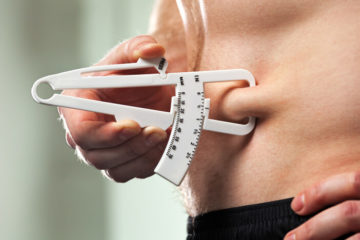Coffee as an aid to weight loss - An unknown miracle drug?

For most people, coffee is an indispensable part of everyday life. The first cup of the day is particularly necessary for starting the day fit and alert.
We have all heard that coffee stimulates the metabolism, but the notion that coffee is also a slimming product is new to many.
Can drinking coffee really help you to lose weight effectively? In this article, we will show you the advantages and disadvantages of drinking coffee when trying to lose weight.
General information about coffee

There are over 125 different types of coffee. They develop differently depending on temperature, rainfall and altitude and vary in their maturing period and aromas.
The two most important types are:
- Arabica *: better taste, caffeine content: 1-1.7%
- Robusta: contains more chlorogenic acid, caffeine content: 2- 4.5%
Most coffees are a blend of both types of coffee to achieve a better taste and at the same time a higher caffeine content.
Quality of the coffee
The quality of the coffee does not depend on the region, but on its harvest and processing. Coffee beans harvested by hand are of a higher quality than beans harvested by machine, because only the ripe beans are picked.
Arabica beans are very demanding and can only be grown at an altitude of over 900 m. They also ripen at different speeds, so harvesting is done manually by hand. This gives them a higher quality than the Robusta beans, which are harvested by machine.
This is also reflected in the price:
The more expensive the coffee, the higher its quality.
However, the ingredients are almost the same regardless of the quality — it is only the taste that differs.
Powdered, instant or soluble coffees contain mostly the same ingredients as normal filter coffee. Again the only difference is in the taste.
Coffee preparation methods
The ingredients of coffee can depend on the way they are prepared. One can distinguish between the following:
| Method | Preparation | Caffeine Content |
|---|---|---|
| Cold brew | Coffee powder is mixed with water and left to soak for 8-24 hours. The coffee is then filtered. | Equal or up to 9% higher than in a hot infusion |
| Cold drip | Water or ice is added drop by drop onto the coffee powder. One drop per second. | 39% more caffeine content than in a hot infusion |
| Hot coffee infusion | Standard coffee infusion with hot water | On average 100mg caffeine / 200ml |
Cold Drip and Cold Brew coffee are said to contain less acid than standard coffee infusions. This is however not true.
How does coffee affect our body when we are losing weight?

Coffee has noticeable effects on our body. In the following section, we will examine the advantages and disadvantages coffee has when losing weight.
Caffeine - increased energy consumption
It is well known that caffeine makes us feel awake. Caffeine is a white, odourless crystal and has a bitter taste. It is a naturally occurring purine and is broken down by the body into uric acid. In its pure form, caffeine is even toxic.
One cup of coffee contains on average about 100 mg of caffeine.
Within 30 minutes, caffeine starts to affect our body and is distributed throughout the body by the blood.
- Caffeine affects our brain by blocking adenosine. Adenosine is a messenger substance that signals fatigue to our body. Thus we can continue to work without any restrictions.
- The activity of the body is increased. This results in increased energy consumption and fat burning is promoted.
- This also boosts the metabolism. The resulting stimulated lipolysis breaks down fat and draws it in for energy supply.
These effects occur with a quantity of only 50 mg of caffeine and last for up to 4 hours. With a consumption of 300 mg caffeine per day (corresponds to approx. 2-3 cups of coffee) the body uses additionally approx. 80 kcal per day.
Want to get your metabolism going without caffeine? In this article we will tell you how you can boost your metabolism through your diet.
Caution: Calorie trap - you should pay attention to this!
Sweetened caffeinated drinks cancel out this effect and without exercise and a change of diet, even caffeine cannot help you achieve great success in losing weight. The quantity is also decisive:
A lot of coffee doesn’t help much!
The body quickly gets used to the caffeine and thus makes its special effect ineffective.
2-3 cups a day is the recommended amount to achieve the greatest success in losing weight.
It is important to drink the coffee black, i.e. without milk and sugar. This stops the fat burning process and means that you consume additional calories.
Calories per cup (200 ml):
| Coffee preparation | Calories | |
|---|---|---|
| black | 4 kcal | |
| with some milk | 8 kcal | |
| with milk and sugar | 24 kcal | |
| a Latte | 86 kcal | |
| an Espresso | 18 kcal (25ml espresso cup: 2 kcal) |
Those who often resort to sweetened caffeinated drinks such as Coca Cola or sweetened lattes are likely to gain weight. The caffeine does not negate the calories ingested.
If you still can’t do without the sugar in your coffee, our sugar guide will show you how you can sweeten your coffee without it becoming a calorie bomb.
When is the best time to drink my coffee?
- Before exercise?
Caffeine increases athletic performance. So if we drink a coffee before our workout, calories can be burned better because the muscles are better supplied with oxygen.
- Before tasks/ before work?
Since caffeine has an effect on our brain and thus improves our attention, it makes sense to drink a coffee before we get into our tasks for the day.
- Before going to bed?
Caffeine has an effect on sleep: it keeps us awake and our tiredness disappears. A coffee in the evening will stand in the way of a restful sleep.
Myth - coffee has a laxative and dehydrating effect
Does coffee have a dehydrating effect?
Caffeine stimulates kidney function, which leads to earlier fluid excretion. However, the amount excreted is almost identical after coffee and water consumption. However, this only applies if you are used to coffee consumption. If you drink coffee again after not drinking it for a long period of time, it can temporarily lead to an increased urine production.
Does coffee have a laxative effect?
Coffee consumption stimulates intestinal activity. The hormone responsible for this is cholecystokinin, which is secreted by the caffeine in coffee. Caffeine thus aids digestion and can have a laxative effect. This effect is lessened, but not necessarily ruled out entirely, by the combination of other substances contained in coffee. Decaffeinated coffee prevents this effect.
Other effects of coffee
In addition to the effects of coffee on our body described above, it has other effects, both positive and negative:
| Advantages | Disadvantages |
|---|---|
| Metabolism is activated | Risk of addiction |
| Positive influence on cardiovascular diseases | Increases PMS symptoms in women |
| Alleviates pain (e.g. headaches & migraines) | Heartburn |
| Higher performance & concentration | Sleep disturbances |
| Increases endurance & muscle power |
Green coffee for losing weight - the natural fat burner

Every coffee was once a green coffee. The difference? In green coffee, the beans are not roasted.
Compared to “normal” coffee, it tastes more sour and more bitter and is therefore not to everyone’s taste. Its special feature: a high proportion of chlorogenic acid (CGA).
Green coffee has a content of 5-12 g of CGA per 100 g beans, which corresponds to approx. 0.5-1.2 g CGA per cup. A cup of coffee with roasted beans, on the other hand, contains only 0.05 – 0.15 g CGA.
But what does chlorogenic acid do?
CGA is responsible for the sour taste and is considered a natural fat burner.
Glucose metabolism - a more stable blood sugar level
CGA delays the absorption of glucose. This means that the carbohydrates are absorbed more slowly in the intestine and therefore the blood sugar level rises more slowly. As a result, the body produces less insulin, which prevents rapid drops in blood sugar levels.
When the blood sugar level is below 1 g/l, the body draws on its reserves – the fat reserves. CGA can therefore reduce fat mass and help you lose weight.
A further positive effect of green coffee is that it prevents food cravings, as blood sugar levels fall more slowly. This can also reduce your calorie intake.
Lipid metabolism - lower cholesterol level
CGA inhibits the absorption of fat in the intestine. This reduces triglyceride and cholesterol levels.
Like caffeine, CGA stimulates the fat metabolism. This also has a positive effect on the reduction of fat mass, body weight and BMI. Fatty acids are broken down to a greater extent by the consumption of green coffee.
Preparation of green coffee
The preparation of green coffee is similar to that of tea:
Pour 200 ml of hot water over about 10 g of ground beans and leave to infuse for 10 minutes. Then filter out the beans or, as a simpler alternative, use a tea strainer right at the beginning.
At the moment green coffee* is only available in online shops.
So is green coffee superior to black coffee?
In terms of taste, black coffee is definitely better, but green coffee seems to be a promising choice for losing weight. However, there is still a need for more research on this topic. Since there have not yet been any long-term studies on the exact effectiveness of green coffee on weight loss, the question remains unanswered for the time being.
Other foods with high chlorogenic acid content (mg/kg)
- Coffee: 50-150 mg (per 200 ml)
- Apples: 30-60
- Spitterling: 1500
- Blueberries: 500-2000
- Potatoes: 1400
Are there alternatives to coffee?
Caffeine is found in over 60 other plants, e.g. guarana, cocoa plant, maté tree, kola nut, tea bush.
| Caffeine Content (per cup/glass) |
Calories | |
|---|---|---|
| Coffee | 100 mg / 200 ml | 4 kcal |
| Black & green tea | 40 mg / 200ml | 0 kcal |
| Guarana | 80-160 mg / 200 ml (4 g Pulver) | 11 kcal |
| Coca-Cola | 20 mg / 200 ml | 76 kcal |
| Club Mate | 40 mg / 200 ml | 40 kcal |
| Red Bull | 80 mg / 250 ml | 113 kcal |
| Dark chocolate | 90 mg / 100 g | 394 kcal |
| Milk chocolate | 15 mg / 100 g | 535 kcal |
When brewing coffee, the following applies: The longer the coffee powder is in contact with water, the more caffeine is contained in the drink.
Caffeine and tea
Theine was discovered in tea leaves as early as 1827. Eleven years later it was discovered that it is the same substance as in coffee – caffeine.
So tea and coffee contain the same active ingredient.
The younger the tea plant, the more caffeine it contains. The longer the tea is infused for, the higher the caffeine content.
However, the caffeine from tea has a slightly different effect on the body than that of coffee: the caffeine level is built up more slowly, but also falls back down more slowly. This means that the effect starts later, lasts longer and is overall more gentle. A performance-enhancing effect may therefore not occur.
Coffee during pregnancy?

The European Nutrition Agency considers the consumption of 200 mg caffeine per day to be safe for pregnant women. However, this recommendation should be viewed critically.
If a pregnant woman consumes coffee, the concentration of caffeine in her blood, and also her placenta, increases. In addition, she breaks down caffeine much more slowly than usual. The foetus is therefore also affected by the mother’s caffeine consumption.
The effects: The foetus moves around more and its heart beats faster.
The higher the mother’s caffeine consumption, the greater the likelihood that the baby will be born with a lower birth weight.
Consumption is less risky during the breastfeeding period because the milk contains significantly less caffeine than the mother consumes, but the baby can still take in caffeine.
Can you drink too much coffee?
A consumption of more than 2 g of caffeine, can be dangerous for us. One cup of coffee contains about 100 mg of caffeine, which means you would have to drink at least 20 cups of coffee in a very short time to reach this dose. Such a high amount of caffeine is more likely to be achieved from caffeine tablets or energy drinks.
Symptoms of a caffeine overdose are:
- Restlessness
- Nervousness
- Insomnia
- Facial flushing
- Increased urge to urinate
- Muscle twitching
Consequences of a coffee overdose:
- Cell death: Caffeine increases calcium levels by releasing calcium.
- Cardiac arrhythmia: Caffeine inhibits adenosine (responsible for heart rhythm). In the long run this can be life threatening.
The life-threatening dose is 5 g caffeine.
How can you recognise a coffee addiction?
A caffeine addiction is controversial even in professional circles. Only about 58% of health care personnel take it seriously and consider it a disease.
These could be symptoms of a caffeine addiction:
- Compulsive need to consume caffeine
- Loss of control over quantity and period of consumption
- Withdrawal symptoms during weaning, e.g.
- Headaches
- Tiredness
- Irritability
- Increased caffeine tolerance
- Insomnia
- Nervousness
- Restlessness
A caffeine addiction rarely occurs from a moderate consumption of 2-3 cups of coffee per day.
Conclusion - So is coffee a miracle cure for losing weight?
Coffee boosts our metabolism and can therefore promote weight loss. It does not matter whether you drink filter coffee or soluble coffee, the ingredients are the same. Even decaffeinated coffee can contribute to this effect due to chlorogenic acid.
When losing weight, it is important to drink coffee without milk and sugar, otherwise its effects will be reversed. Nevertheless, coffee is not a miracle cure for losing weight, it merely supports the process. Sufficient daily physical activity and a balanced diet should not be neglected.
Sources
Beiglböck, W. 2016. Koffein – Genussmittel oder Suchtmittel? Berlin Heidelberg: Springer-Verlag
Mörlins, F. 2014. Grüner Kaffee und grüner Tee – Ein möglicher Beitrag zur Gewichtsreduktion. Bachelorarbeit, Hochschule für Angewandte Wissenschaften Hamburg
https://utopia.de/ratgeber/koffein-wirkung-nebenwirkung-und-was-du-sonst-noch-wissen-solltest/
http://www.gesundheits-lexikon.com/Ernaehrung-Diaeten/Genussmittel/Kaffee.html”
https://fdc.nal.usda.gov/fdc-app.html#/?query=ndbNumber:14209
https://praxistipps.focus.de/verstopfung-wie-und-warum-kaffee-dagegen-helfen-kann_97797
https://www.lgl.bayern.de/lebensmittel/warengruppen/wc_46_kaffee/ue_2018_cold_brew.htm
https://www.gesundheit.de/ernaehrung/richtig-trinken/tee-und-kaffee/koffein



